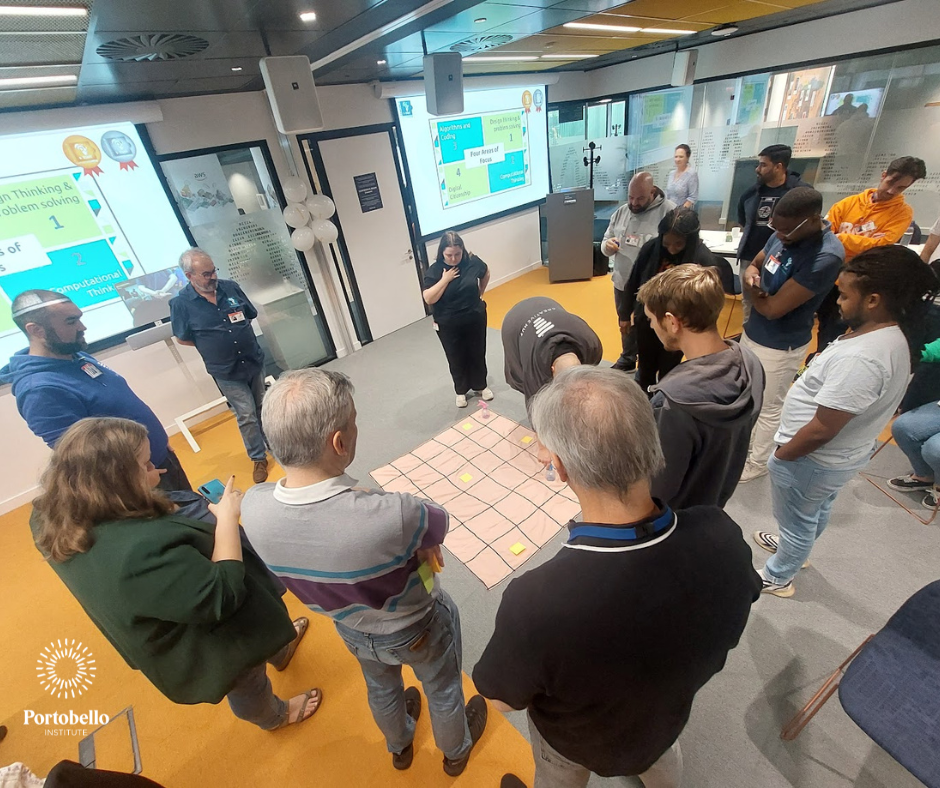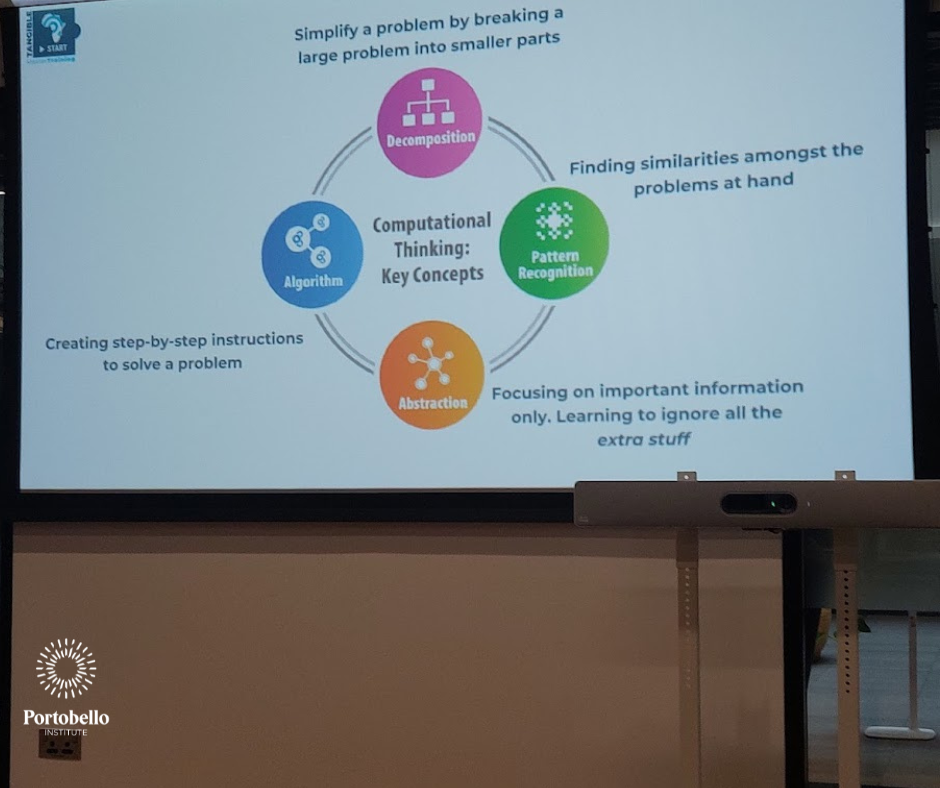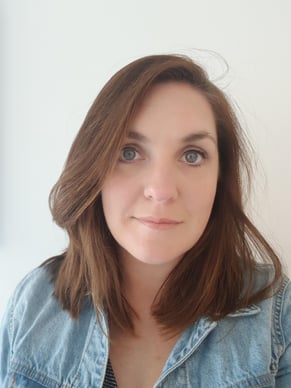Imagine a world where every child, regardless of their circumstances, has access to the power of coding and computational thinking.
A world where even those in remote 'unplugged' communities can become the software developers of tomorrow.
This vision is the driving force behind Tangible Africa, an initiative that is empowering students to become problem solvers and critical thinkers.

Recently, Pauline Maguire, Head of Academic Operations at Portobello Institute, attended the Tangible Africa training at the Amazon Webservices (AWS) office in Dublin, which was run in conjunction with AWS in Communities and Creative Hut Ireland and was facilitated by Prof. Jean Greylin and Jackson Tshabalala of the Leva Foundation.
The training aimed to make her a Tangible Master Trainer, equipped with the tools and knowledge to bring the transformative power of computational thinking to students of all ages.
So, what exactly is Tangible Africa, and how does it achieve its ambitious mission?
At its core, Tangible Africa places coding concepts within reach of any child willing to learn, bridging the gap for those without access to computers, the internet, or electricity. It does this through cost-effective instruments, implemented by teachers or facilitators who might not be qualified programmers themselves.
The brainchild of a 21-year-old student, Byron Batteson, the concept was born in Gqeberha, South Africa, and quickly gained momentum under the guidance of Prof. Jean Greyling from Nelson Mandela University.
The partnership between Byron and Prof. Greyling exemplifies the power of collaboration between students and teachers. Byron, now a software developer for Amazon in Cape Town, South Africa, brought the original TANKS app to life, while Prof. Greyling expanded the concept, making it a tangible reality.
Since its launch in 2017, Tangible Africa has grown to include two more apps, RANGERS and BOATS. These apps have already made a significant impact on thousands of bright minds in countries as diverse as Ghana and Ireland.
The goal is to give students access to the fundamentals of coding and support the development of computational thinking, empowering them with essential skills that will serve them well in any field they choose to pursue.
Computational thinking is more than just coding; it's a problem-solving approach that draws on concepts and techniques from computer science to tackle complex problems in a systematic and efficient manner. It involves breaking down problems into smaller, manageable parts and devising algorithms or step-by-step instructions to arrive at solutions. While computational thinking has its roots in computer science, its applications extend far beyond the world of programming.
The key concepts covered in the Tangible Africa programme are:
- Decomposition: Breaking down complex problems into smaller, more manageable tasks. This process enables students to understand, analyse, and address each component separately, leading to a deeper understanding of the problem as a whole.
- Pattern Recognition: Identifying patterns and trends in data or information. Recognising patterns allows students to develop generalisations and abstractions, which can be applied to similar situations in the future.
- Abstraction: Focusing on essential characteristics while ignoring irrelevant details. Abstraction simplifies the problem, making it easier to work with and understand, without losing its core aspects.
- Algorithm Design: Creating step-by-step instructions or processes for solving problems efficiently. Well-designed algorithms are clear, unambiguous, and optimised for efficiency, leading to effective problem-solving.

Integrating computational thinking exercises into the curriculum is not about turning every student into a computer programmer. Instead, it's about nurturing their cognitive abilities and problem-solving skills, which can benefit them across all aspects of education and beyond.
This approach cultivates a mindset of curiosity, exploration, and resilience, empowering students to become confident and capable learners throughout their lives.
During the two-day training, Pauline and other delegates had the opportunity to explore Tangible Boats, designed for students aged 4-8, and Tangible Rangers, tailored for students aged 8 and above.
Through hands-on experience, they learned how to engage and inspire students using these innovative apps, opening the doors to a world of computational thinking and problem-solving.
Over the coming months, Pauline will begin the process of training the tutors at Portobello Institute on how to facilitate this sort of learning.
Tangible Africa is igniting a spark of curiosity and creativity in young minds, transcending barriers to education and empowering students to unlock their full potential. By incorporating computational thinking into the learning journey, we are not just preparing students for a digital future; we are shaping a generation of critical thinkers who can thrive in any endeavour they pursue.
About the Author

Pauline Maguire is the Head of Academic Operations at Portobello Institute.
Pauline has had a varied career over the last two decades. She began in 2002 in Audio Video Production, while completing a BA (Hons) in Communications & Creative Multimedia. By 2006, her career took a u-turn, when she retrained in Montessori Education at Portobello Institute and opened a Montessori Pre-school in Malahide in late 2006. Montessori Education and the concept of child-led, constructionist education is a passion of Pauline’s. In 2010, together with her husband, she co-founded Learnit – where they introduced STEM concepts to children using LEGO® Education. Soon after, they became Ireland's only LEGO® Education Academy Certified Teacher Trainers and official partners of IET to run FIRST® LEGO® League programmes across the country.
In 2018, after 12 years of running the preschool and Learnit, Pauline closed her Montessori School and took a backseat within Learnit. Driven by her passion for both creative multimedia and teaching, she pursued and completed an MSc in Education and Training Management (eLearning), joining Portobello Institute in 2019 as eLearning Manager, before taking on the role of Head of Academic Operations in 2022.
More information
If you would like more information on any Early Years & Montessori or Inclusive Education courses you can visit our department pages.
For Early Years and Inclusive Education Studies, you can book a 15-minute consultation call with Jennifer Matteazzi at a time that suits you. Or you can email jennifer.matteazzi@portobelloinstitute.com or call her directly on 01 892 0031.
Read More: How to Integrate Cultural Diversity in the Early Years Classroom





.png?width=352&name=Michelle%20-%20KZ%20images%20(2).png)